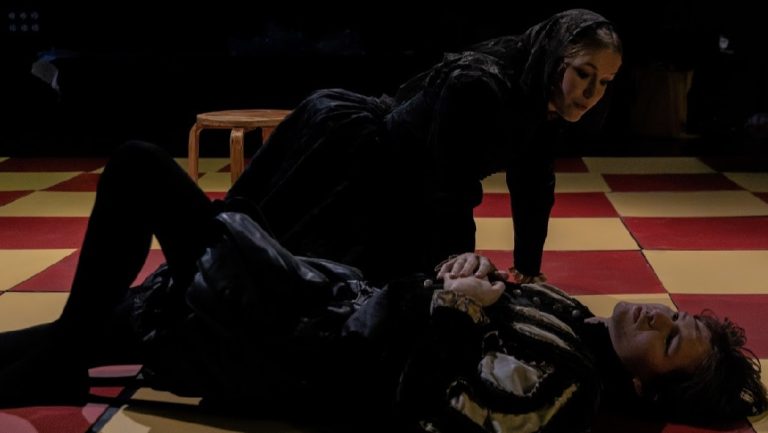CW: Sexual assault
The Michael Pilch Studio might just have been the perfect venue for Women Beware Women. Intimate and beguiling, the audience were made to feel almost as naked as many characters onstage wanted to be.
I attended the final Friday-night performance of the three-night run. Inside the black-box, pillars were wrapped in ribbon. The stage was styled like a chess board, with red and yellow tiles. Remix Artist Ice Dob’s dubstep intensified an already claustrophobic and charged atmosphere. The space channeled Alice’s Wonderland, inspired by what director Jem Hunter calls the “psychological alterations brought about by opiates”.
The plot of Middleton’s Women Beware Women (1657) is just as trippy. We meet the beautiful Bianca (Fiona Bestrova) right after she’s eloped with Leantio (Hugh Linklater). When Leantio’s mother (Kate Burke) visits the scheming Livia (Caeli Colgan), Livia forces the mother to bring Bianca over for dinner. Bianca, excited to be free from the house arrest her possessive husband has imposed on her, goes for what she thinks is a tour of the house. Bestrova endearingly conveys Bianca’s childish glee at this prospect. However, while on this tour, Bianca is accosted by the Duke (Sonny Fox). When his attempts to seduce Bianca fail, she is taken by force.
In Middleton’s text, Bianca’s rape occurs offstage. In Hunter’s production, the assault occurred onstage, thinly concealed by strobe lights and an awkward choice of choir music. I was seated in a position of relative safety: I could only see the actors from a distance, and had no view of their faces. Unlucky audience members had to grapple with far closer proximity to the actors. “I think at that point, I just had to close my eyes”, says an audience member who found themselves with a close-up view of Bianca’s face during the scene.
Immediately following this scene came the welcome refuge of the intermission. When the second half commenced, there were many empty seats. I spoke to various audience members who cited the graphic depiction of sexual violence and the absence of a content warning as contributing to their decision to leave the performance. Whilst there was a content warning for “sexual assault and coercion” in the play’s description on TicketSource, this was absolutely insufficient communication. It would have taken less than thirty seconds to reiterate a content warning at the start of the play, or to make a sign for the door. In fact, there was already a warning sign on the theatre door for strobe lights, which could easily have accommodated a content warning.
The play did showcase some excellent performances. Bestrova beautifully conveyed Bianca’s shift from enamoured ingénue to social-climbing cynic. Linklater embodied Leantio’s controlling nature, delivering dialogue compellingly. Colgan, donning Livia’s widow’s attire, had an almost intoxicating command of the stage. It’s no easy feat to convey the emotional complexity of a villain, especially a villain as nefarious as Livia. Colgan, however, accomplished this magnificently without even breaking a sweat.
Interwoven with the story of Bianca and Leantio is the story of Isabella (Céline Denis). Isabella is unhappily engaged to the Ward (Juliet Taub). In Middleton’s text, the Ward is a foolish, intolerable heir. Hunter, in a genius twist, envisions the Ward instead as a literal fool. Taub dons clown makeup, a crocheted jester’s hat, and jingles a mini-me teddy bear in the faces of audience members. She infused the play with charisma and energy.
Whilst Isabella wrestles with her unhappy engagement to a fool, she simultaneously has an affair with her uncle, Hippolito (Kit Parsons). Not to worry: Livia says that they’re not actually related. Alas, would you believe it, Livia –ever untrustworthy –was lying. Hunter told Cherwell that he wanted the theatre “to feel like a boudoir, and the audience the participants of something very debauched”. Hippolito’s grotesque monologue, in which he confesses his desire for his niece, certainly achieved this. Parsons’ delivery was appropriately conflicted and tormented. Rather than portraying Hippolito as a cut-and-dry pervert, he was conveyed as a lonely and tormented individual.
In an experimental twist on Middleton’s masque, strobe lighting spotlighted raving characters dotted around the chessboard stage. As each doomed character met their end, a red light flared, the same red light that had flared throughout the play whenever lust was consummated with a kiss. Hunter calls lighting designer Michelle Ng “a true professional” and “a visionary”, citing Ng’s work on Yasmin Nachif’s ‘Tis Pity She’s a Whore (2024). The circularity of Ng’s visual storytelling was pleasing and cohesive.
Controversial but compelling, Women Beware Women showcased some incredible talent. When asked why he chose to stage Middleton’s play, Hunter says that “on some level, strangely, the characters inspire me? The line between taboo desire and queer desire has always felt thin to me.” Right or wrong, it was undoubtedly a performance to remember.









